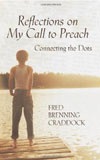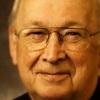Skill Builders
Article
A Review of Fred Craddock's Book 'Reflections on My Call to Preach'

Someone else's story often provides a window into your own soul. This is especially true for preachers when that story is about the call to preach. Fred Brenning Craddock, widely recognized as one of the most effective preachers in the English-speaking world, tells his story in Reflections on My Call to Preach (Chalice Press, 2009). With only 117 pages, the book is an easy read. But it will keep you pondering how to connect the dots of your own experience and gain greater clarity into the way that your call to preach took shape.
Craddock's story certainly contains the intrigue that makes all good stories compelling. For example, Miss Jane, Craddock's beloved Sunday school teacher, eventually became the mother of NFL quarterback Archie Manning and the grandmother of NFL quarterbacks Peyton and Eli Manning. Furthermore, Craddock knew as a boy that his first and middle name came from the main character in Fred Brenning: A True Story for Boys. Craddock's grandmother gave this name to his father, from whom he inherited it. All he knew, though, was that this book told the story of a boy who was rescued from some wild, unruly friends and eventually responded to a call to preach. Neither Craddock nor his father had ever seen it. But in 2005, long-time family friends came across a copy and gave it to Craddock. He was surprised to discover that his story resembled Fred Brenning's story in several ways. Both were short in stature. Both were a product of Sunday school. Both began their ministry in the Southern Appalachians—Brenning in a village called Oak Post, and Craddock in a village called Post Oak.

But while the details make the story compelling, the genius of this volume is the way Craddock wrestles with the two aspects of God's call. Craddock describes these as "God called" and "I decided," and he sees them resembling two sides of the same coin. He suggests that we do not experience these as a drama in two acts. In fact, we are not always aware of them. Craddock comments: "I do believe that the ways of God are not always obvious, and that an initiative of God as important as calling a person to preach can be mediated, and not necessarily be direct. The voice of God can sound very much like that of a parent, or a sibling, or a friend, or a stranger."
Craddock first felt stirrings toward preaching when he was 16 and attended Bethany Hills, a church camp and conference center. The outdoor setting, friendships, singing, classes, and evening worship by the lake provided the beauty and vision out of which his call began to take shape. Yet after high school, when Craddock returned to Bethany Hills as counselor intern, he began to wonder if his call to ministry was real. It had come in the midst of an unreal world, influenced by lakeside consecration services that stirred idealistic, even romantic, notions of ministry. Besides, his first opportunity to preach a sermon had been such a dismal failure that he felt he had no future in the pulpit. Oddly enough, after a time of saying no to God, Craddock said yes to Floyd, a rough co-worker with whom he was driving nails. Floyd, whose only light on the horizon was a cold beer, had heard a rumor that the young man with whom he was working was a beginning preacher. So he asked Craddock, "Have you been called to preach?"
Craddock offers this reflection on Floyd's role in his call: "God sometimes calls through one's realization of the needs of people among whom one lives. Floyd and the hundreds like him in my little town were … the reality shouting out the need for ministry."
Craddock's story has given me a lens through which to view my own call to preach. Like Craddock's call to preach, mine began to take shape as I basked in the glow of the Bible conferences and Bible camps I attended in my youth. The thought of preaching the Bible to receptive listeners stirred something within me. But my call had to be grounded in reality. Managing a 51-unit apartment complex during my seminary years solidified my call to preach. The tenants were, for the most part, rough around the edges, and domestic altercations were frequent. I learned what it meant to share the gospel with the guy who insisted that his girlfriend get an abortion, as well as with the tenant who pulled a knife on his ex-wife's new boyfriend. Both the idyllic vision and the grim reality of ministry had a place in my call to preach.
For those who have struggled with the certainty of their call to preach, some of Craddock's final words offer encouragement: "You may decide for ministry by only 51 percent, but once you do it, give it 100 percent and very likely someone will approach you to ask, 'You seem so certain; when and where did it come to you?'"
Thanks to Craddock's book, I will continue to reflect on "God's call" and "my decision." His story helps me understand my own and compels me to "press on to take hold of that for which Christ Jesus took hold of me" (Philippians 3:12).
Steve Mathewson is senior pastor of CrossLife Evangelical Free Church in Libertyville, lllinois. He is also director of the doctor of ministry program at Western Seminary in Portland, Oregon.














